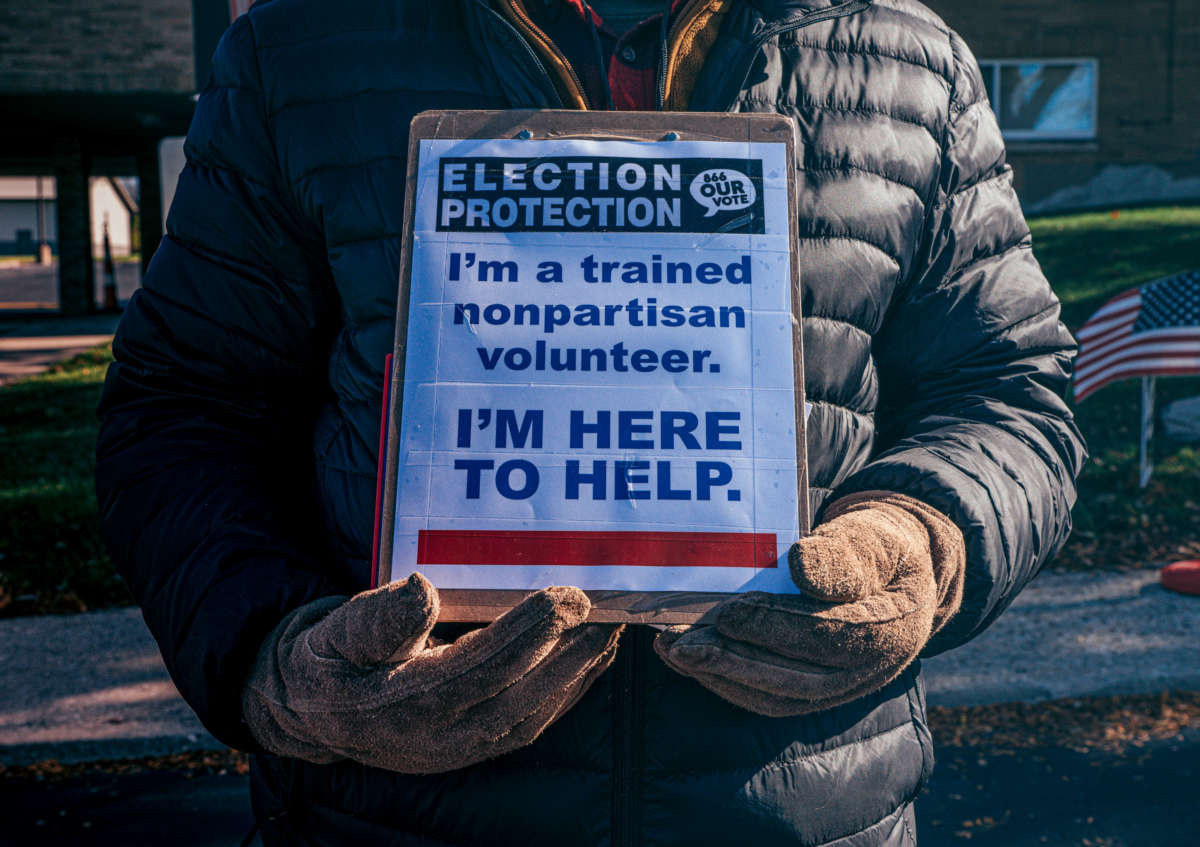Truthout is an indispensable resource for activists, movement leaders and workers everywhere. Please make this work possible with a quick donation.
This spring, the Brennan Center commissioned a national survey of election officials. We found that roughly one in three feel unsafe because of their job, and approximately one in six listed threats to their lives as a job-related concern.
In order for democracy to function, we cannot accept this situation. Election officials across the country, regardless of political affiliation, risked their lives in a pandemic to help us vote safely in 2020, with the highest turnout since 1900. They are being repaid with violent threats and intimidation, political interference, and disinformation campaigns that paint them as cheaters instead of the heroes that they are.
There are several priorities for Congress to consider.
First, violent threats against election officials and associated election disinformation are ongoing problems and they threaten the security of our elections. Congress should provide support for the protection of election officials and workers.
Second, the Election Administration Commission and the Cybersecurity Infrastructure Security Agency have worked to help with combating election disinformation and mal-information, or doxing. This includes their work to promote auditable paper ballot systems. This work should continue, with support from Congress.
Third, Congress should protect election officials from partisan interference.
In the spring, we partnered with the Bipartisan Policy Center and the Ash Center for Democratic Governance and Innovation at Harvard’s Kennedy School to conduct interviews and conversations with dozens of election officials and over 30 other experts. The result was a report published last month, and what we learned from these discussions was heartbreaking.
We found that local election officials feel unsafe because they are being harassed and threatened in the wake of the 2020 election. Several of them reported that their family members, including elderly parents and young children, were harassed using crude language or threatened with violence last year.
Multiple election officials told us that the persistent harassment forced them and their families to flee their homes and seek mental health treatment for their children. And when they reached out to law enforcement for help, the response was often insufficient to ensure the official and their family felt safe.
In addition to the appalling harassment and threats, many experienced interference by partisan and political leaders. As president, Trump famously placed a phone call to Georgia Secretary of State Brad Raffensperger, in which he pressured Raffensperger to “find 11,780 votes.”
We have found that less sensational forms of this disturbing political interference abound. Many state and local party leaders have censured officials who told the truth and refused to undermine the legitimacy of the 2020 election. A law was passed in Georgia that replaces the secretary of state as the chair of the State Election Board with a legislative appointee. Other states have introduced bills that would criminalize acts like sending mail ballot applications to voters.
Virtually every election official we spoke with indicated that this behavior is partially driven by mis- and disinformation about the election. Lies about the 2020 election, in particular the lie that it was stolen, serve to instigate and legitimate attacks on election officials. One official compared the attempt to combat online disinformation with truthful information to screaming into a hurricane.
Ongoing partisan reviews being conducted or sought in locations like Maricopa County, Arizona, present an example, happening in real time, of how false claims of election discrepancies can be amplified by prominent voices. And the disinformation campaigns they fuel continue to harm election officials. When Arizona Secretary of State Katie Hobbs spoke out against the incompetent review, credible threats against her increased, resulting in Republican Gov. Doug Ducey providing her with a personal security detail.
Our report identifies a number of solutions to these threats to our democracy. These include three ways Congress can help.
First, the Department of Justice recently announced a task force to address the rise in threats and intimidation of election officials and election workers. Legislators should consider funding for safety training, including how to protect one’s personal information, and physical security of election offices.
Second, the underlying problem of disinformation is a task for the whole of society to tackle, and the private sector will likely need to play a large role. Social media companies could choose to promote truthful information from election officials over attention-grabbing conspiracy theories. Hearings like this that recognize the contributions of local election officials also play a role.
Finally, Congress can explore legislation that protects election officials from unwarranted partisan removals.
A terrifying moment. We appeal for your support.
In the last weeks, we have witnessed an authoritarian assault on communities in Minnesota and across the nation.
The need for truthful, grassroots reporting is urgent at this cataclysmic historical moment. Yet, Trump-aligned billionaires and other allies have taken over many legacy media outlets — the culmination of a decades-long campaign to place control of the narrative into the hands of the political right.
We refuse to let Trump’s blatant propaganda machine go unchecked. Untethered to corporate ownership or advertisers, Truthout remains fearless in our reporting and our determination to use journalism as a tool for justice.
But we need your help just to fund our basic expenses. Over 80 percent of Truthout’s funding comes from small individual donations from our community of readers, and over a third of our total budget is supported by recurring monthly donors.
Truthout has launched a fundraiser, and we have a goal to add 182 new monthly donors in the next 24 hours. Whether you can make a small monthly donation or a larger one-time gift, Truthout only works with your support.
